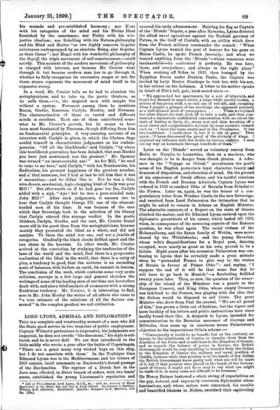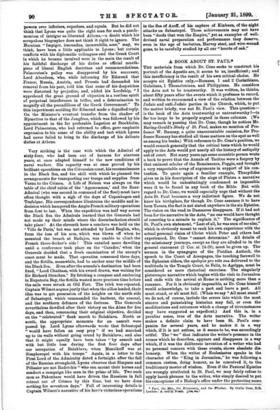LORD LYONS, ADMIRAL AND DIPLOMATIST.* Tins is a complete and
trustworthy memoir of a man who did the State good service in two branches of public employment. Captain Wilmot's portraiture is impressive, his judgments are impartial, he does not overdo "the document," his style is cul- tured, and he is never dull. We are first introduced to the little middy who wrote, a year after the battle of Copenhagen, "There are a great many very wicked boys on this ship, but I do not associate with them." In the Trafalgar time Edmund Lyons was in the Mediterranean, and his letters of 1807 contain lucid comments on Duckworth's forced passage of the Dardanelles. The capture of a Dutch fort in the Java seas, effected, in direct breach of orders, with two boats' crews, established the young Lieutenant's reputation and
• Life of Vice-Admiral Lord Lyons, G.C.B., with an Account of Naval Operations .n the Black Sea and Sea of Azoff, 1354-66. By Captain S. Eardley- Wilmot, R.N. (Retired). Illustrated. Loudon: Sampson IOW. Marston, and 00. (21B4
ensured his early advancement. Hoisting his flag as Captain of the Blonde' frigate, a year after Navarino, Lyons directed the allied naval operations against the Turkish garrison of Patras, in the Gulf of Corinth, with an ability which drew from the French military commander the remark : " When Captain Lyons wanted the post of honour for his guns at
Mores. Castle, he spoke French fatuously; and when we wanted anything from the ' Blonde '—whose resources were inexhaustible—he understood it perfectly. He was here,
there, and everywhere ; and always in the right place." When cruising off Sidon in 1832, then besieged by the Egyptian forces under Ibrahim Pasha, the Captain was invited by Lady Heater Stanhope to visit her, with his son, in her retreat on the Lebanon. A letter to his mother speaks in detail of Pitt's tall, pale, hook-nosed niece:—
" We approached her apartments by a sort of labyrinth, and found her dressed in man's attire, a large white muslin turban, a pelisse of tea-green stuff, a second one of red silk, and excepting when I caught a glimpse of her stockings, she appeared precisely as a well-dressed Arab of consequence When we rejoined her after dinner she sent Jack off to take a walk, and then com- menced a mysterious confidential conversation with me about the state of feeling in Syria. &c., every now and then breaking off a must clever and comprehensive account by some eccentric remark such as : I have the horse mentioned in the Prophecies. It has two backbones. I could show it, but it is out at grass.' Then again : I have discovered the proof of the divinity of kings. I acquired my influence with the Arabs by various exploits. I once cut my way on horseback through hundreds of them.' "
Later on the 'Blonde' served as voluntary convoy from Malta to Nauplia to Lamartine, then on a sea-tour, who was thought to be in danger from Greek pirates. A refer- ence in the " Voyage en Orient " accentuates the poet's sense of his English protector's loyal character, beauty and firmness of disposition, and elevation of mind. On the ground of his experience of Greek affairs, and his tactful relations with the French and Russian Admirals, Captain Lyons was
ordered in 1833 to conduct Otho of Bavaria from Brindisi to the Pira3us. Later on, again, he was the bearer of a con-
gratulatory letter from Windsor Castle to the new Sovereign, and received from Lord Palmerston the intimation that he might be asked to remain in Athens as English Minister. The admirable contents of a Report on the state of Greece clinched the matter, and Sir Edmund Lyons entered upon the diplomatic parenthesis of his career, which lasted till 1853, when, in consequence of the menacing aspects of the Eastern question, he was afloat again. The racial virtues of the Hohenzollerns, and the Saxon family of Wettin, were never shared by the Wittelebachs ; and the young Bavarian, whose wife's disqualifications for a Royal post, dancing excepted, were nearly as great as his own, proved to be a failure. Eight years after his accession Palmerston was con- fessing to Lyons that he certainly made a great mistake
when he "persuaded France to give way to the wishes of Russia in favour of Prince Otho " : and saying, " I suppose the end of it will be that some fine day he
will have to go back to Munich,"—a foreboding fulfilled twenty years later. Then, as now, the question of the owner- ship of the island of the Minotaur was a puzzle to the European Concert, and King Otho, whose empty Treasury was indebted to the Powers, was playing with the idea that the Sultan would be disposed to sell Crete. The great Minister who drew from Peel the avowal, " We are all proud of him," has grown a little out of fashion; but the vigour and terse lucidity of his letters and public instructions have since hardly found their like. A despatch to Lyons, intended for communication to the Bavarian successor of Cecrops and Miltiades, thus sums up in courteous terms Palmerston's objection to the impecunious Otho's scheme :-
" Consequently it would he no benefit, but on the contrary, an injury, to the inhabitants of Candia, to transfer them from the dominion of the Porte and to add them to the Kingdom of Greece; and as regards the balance of power in Europe, the British Government would be very unwilling to transfer from the Sultan to the Kingdom of Greece the military and naval position of Candia, because while that position is in the hands of the Sultan the British Government know pretty well what use will be made of it, but if that position were placed in the hands of the Govern- ment of Greece, it might not be so easy to say what use might be made of it, in many cases not difficult to be foreseen."
Sir Henry Balwer bestowed a whole string of superlatives on the gay, natural, and supremely courteous diplomatist whose fascinations, and, where sailors were concerned, his notable and beautified likeness to Nelson, exercised their captivating
powers over inferiors, superiors, and equals. But he did not think that Lyons was quite the right man for such a pande- monium of intrigue as liberated Athens,—a doubt which his scrupulous biographer does not think it right to ignore. The Horatian " Impiger, iracundus, inexorabilis, acer," may, we think, have been a little applicable to Lyons ; but certain conflicts with his diplomatic colleagues and the Greek Court in which he became involved were in the main the result of his faithful discharge of his duties as official mouth- piece of liberal English doctrines and recommendations. Palmerston's policy was disapproved by his successor, Lord Aberdeen, who, while informing Sir Edmund that France, Russia, Austria, and Prussia had demanded his removal from his post, told him that some of his despatches were distorted by prejudice, and, added his Lordship, " I apprehend the great ground of objection is a restless spirit of perpetual interference in trifles, and a determination to magnify all the peccadilloes of the Greek Government." To this impertinent scolding Sir Edmund made a dignified reply. On the Minister's eventual transfer from the shadow of Hymettus to that of the Jungfrau, which was followed by his appointment to the far preferable Legation at Stockholm, Lord Palmerston, who had returned to office, gave emphatic expression to his sense of the ability and tact which Lyons had never failed to bring to the discharge of his delicate duties at Athens.
Very striking is the ease with which the Admiral of sixty-four, who had been out of harness for nineteen years, at once adapted himself to the new conditions of naval warfare. His capacity was at once proved by his brilliant operations on the Circassian coast, his reconnaissance in the Black Sea, and the skill with which he planned the arrangements for transporting our troops and supplies from Varna to the Crimea. A Life of Nelson was always on the table of the chief cabin of the Agamemnon,' and the Rear- Admiral (who was second in command of the fleet) must have often thought with a sigh of the days of Copenhagen and Trafalgar. His correspondence illustrates the muddle and in- decision which hampered the Anglo-French military operations from first to last. When the expedition was half way across the Black Sea the Admirals learned that the Generals had not made up their minds where the disembarkation should take place ! At the eleventh hour a conclave was held on the Ville de Paris,' but was not attended by Lord Raglan, who, from the loss of his arm, which was blown off when he mounted the breach at Badajos, was unable to climb the French three-decker's side ! This entailed more dawdling until a conference took place on the Caradoc,' when the Generals decided that a fresh examination of the enemy's coast must be made. That operation consumed three days, and the flotilla, meanwhile, had to anchor near the middle of the Black Sea. Even after the armada's destination had been fixed, " Lord Chatham, with his sword drawn, was waiting for Sir Richard Strachan." By fetching a compass and anchoring in Eapatoria Bay, the flotilla wasted more precious time before the sails were struck at Old Fort. The trick was repeated. Captain Wilmot argues justly that when the allies landed, their idea was to get possession of the heights on the north side of Sebastopol, which commanded the harbour, the arsenal, and the southern defences of the fortress. The Generals nevertheless dawdled after their victory on the Alma for five days, and then, renouncing their original objective, decided on the " celebrated " flank march to Balaklava. North or south, the appropriate moments for an assault were passed by. Lord Lyons afterwards wrote that Sebastopol " would have fallen an easy prey " if we had marched up to its walls without going round by Balaklava; and also that it might equally have been taken " by assault and with but little loss during the first four days after our occupation of Balaklava, when Menzikoff was at Simpheropol with his troops." Again, in a letter to the First Lord of the Admiralty dated a fortnight after the fall of the Russian stronghold, Lyons observes that Simpson and Pelissier are not Radetzkis " who can mount their horses and oonduct a campaign like men in the prime of life. Two such men as Pakenham would have driven the Russians in full retreat out of Crimea by this time, but we have done nothing for seventeen days." Full of interesting details is Captain Wilmot's narrative of his hero's victorious operations
in the Sea of Azoff, of his capture of Kinburn, of the night attacks on Sebastopol. These achievements may not have been "deeds that won the Empire," yet as examples of well. devised naval preparation and performance they deserve, even in the age of barbettes, Harvey steel, and wire-wound guns, to be carefully studied by all our " hearts of oak."



































 Previous page
Previous page